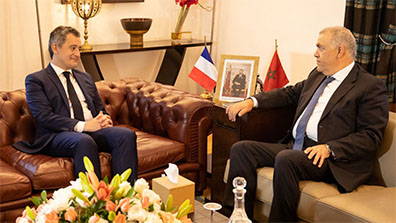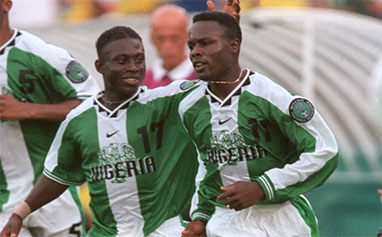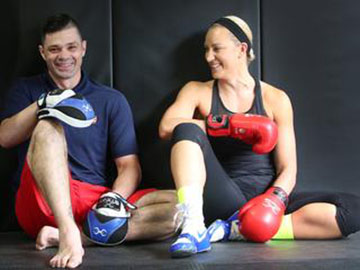Olympics
IOC TAGS ARUNA QUADRI AFRICA’S ALL TIME TABLE TENNIS BEST
Two years after becoming the first African to reach the quarterfinal round of the table tennis event at the Olympic Games, the International Olympic Committee (IOC) has tagged the Nigerian as Africa’s most successful Olympic table tennis player of all time.
IOC published an interview with the Nigerian on its official website recently and they lauded the Oyo State-born athlete for etching his name in the annals of world table tennis history in Brazil.
IOC wrote, “Two decades after he took up table tennis on the streets of Oyo, in south-western Nigeria, Quadri Aruna became the first African to reach an Olympic quarterfinal.”
Quadri reveals in the interview how he beat players “far better” than him at Rio 2016, while recalling his early battles to succeed against all odds and stresses the significant debt he owes his talented wife.
“I actually had no confidence against Chuang Chih-Yuan [Chinese Taipei’s four-time world tour champion, whom Aruna faced in the third round] because earlier in January that year I lost in Germany in the first round 4-0 to him.
“So in Rio I was like, “I have lost before, now I have nothing left to lose, he is a much better player than me.” So, I said to myself, “Just give your best, play and enjoy.” Then I was able to win the first two sets and the match was a different spirit entirely.
“Against Timo Boll [Germany’s three-time Olympic medal winner, whom Aruna played in the fourth round] I was feeling the same way. I was aware the whole world was watching. But before Timo was able to understand my game; I was already 3-0 and it was really too late for him to come back. I stepped up my game and played without pressure because I knew all the players in the Olympic Games are very, very good.
“My performance in Rio really made table tennis much more popular in Nigeria. Whenever I am in the airport now so many officials recognise me now and on the streets, not just where I came from, so many people wave.
“More priority needs to be given to table tennis. Governments need to put people who want to work in sport in the right positions. I am supporting so many players, about six juniors. When I was young no one was able to support me, even with equipment, but these days I am able to help them, to give them equipment and let them play for free.
“My wife was a very good player. Now she doesn’t play professionally. She plays for pleasure, but she is a very good training partner and sometimes she beats me. I am very thankful to her, she is always looking after the kids when I am not at home, which is one of the reasons she is not playing professionally anymore,” Quadri said.
For Tokyo 2020 Olympic Games in Japan, Quadri said: “Like every athlete, I want to do better than I have done before. I want better results in Tokyo. I am always thinking about it. That’s why I am playing in more and more tournaments: it’s preparation for difficult matches in Tokyo.”
Olympics
Paris 2024: France extols Morocco’s aid in Anti-terrorism efforts

French Interior Minister Gerald Darmanin embarked on an official visit to Morocco on Monday, where he expressed appreciation for the kingdom’s invaluable assistance in combatting terrorism within France in the build up to Paris 2024.
With less than 100 days to begin the 2024 Olympics, Darmanin’s visit to the capital Rabat holds particular significance against the backdrop of ongoing efforts to strengthen ties between France and Morocco following a period marked by tensions. Amid a noticeable deterioration in France’s relations with countries in the Sahel region, this stop by Darmanin underscores the importance of fostering closer cooperation and dialogue between the two nations.
“Without the Moroccan intelligence services, France would be more affected by terrorism. We thank them greatly, particularly in anticipation of the Olympic Games,” Darmanin said in a meeting with Moroccan Interior Minister Abdelouafi Laftit.
During his visit, Darmanin emphasised that France and Morocco are committed to collaborating closely to ensure the safety and security of the upcoming African Cup of Nations football tournament, slated to be hosted by Morocco next year. Both nations are poised to leverage their expertise and resources to implement robust security measures, safeguarding the well-being of players, spectators, and officials alike, while France thinks a plan ‘b’ to the Olympics Opening Ceremony.
Darmanin’s visit to Morocco is part of a broader trend that has seen several French ministers engaging with their counterparts in Morocco over the past three months. This concerted effort reflects a shared commitment to catalysing a significant revitalisation of the longstanding relationship between France and Morocco, by fostering enhanced dialogue and collaboration.
In the words of Minister Darmanin: “A profound renewal and modernisation of the French-Moroccan relationship.”
Frictions between Rabat and Paris, historically linked as former colonial partners, surfaced notably in 2021 with France’s imposition of visa restrictions on Moroccan citizens. Moreover, Morocco voiced dissatisfaction with French President Emmanuel Macron’s pursuit of closer ties with Algeria, its regional competitor.
Amid political upheavals marked by coups, France made the decision to withdraw its troops from Mali in 2022, followed by similar actions in Niger and Burkina Faso the year prior. These developments not only strained diplomatic relations but also created a vacuum, which saw a notable increase in Russian military involvement in the Sahel region.
-insidethegames
Olympics
‘Prince of Monaco’, Ikpeba reflects on Nigeria’s most memorable moment at the Olympics

The Confederation of African Football (CAF) website has celebrated Nigeria’s Victor Ikpeba who along team mates was crowned Olympic champion in 1996.
It was 28-years ago that the Super Eagles of Nigeria claimed gold at the 1996 Olympics with Victor Ikpeba forming a part of the star-studded Nigerian squad that had the likes of Jay-Jay Okocha, Daniel Amokachi and Nwankwo Kanu.
The gold medal came two years after the Super Eagles were crowned African champions in 1994, where Ikpeba was also part of the golden generation of Super Eagles.
The former Super Eagles striker who is affectionately called ‘Prince of Monaco’ in Nigeria sat down with CAFOnline to share his memories of the Olympics as the global showpiece edges closer over the next few months.
Cafonline.com What memories do you have of your participation in the Olympic Games in 1996?
Victor Ikpeba: Joy, I was so happy to participate. Pride too when I remember the teams that we beat, Mexico in the quarter-final, Brazil in the semi-final, then Argentina in the final. We Africans have shown that this is possible. It’s a tournament that I will never be able to forget.
Nigeria arrived in the United States with an incredible team. You were there with Jay Jay Okocha, Nwankwo Kanu and Daniel Amokachi. When you get together, do you talk about the good old days?
Yes! We just become kids again. A few months ago, we were invited to Cameroon by the a gala match against the 2000 generation of the Indomitable Lions, for a remake of our African Cup of Nations final. I can tell you that it was as if we had never left each other. There is a lot of respect between us, we support each other from our different backgrounds, that gold medal has undoubtedly bonded us. I think it would be good to set up a WhatsApp group, just to check in on each other more often.
How have these Olympic Games been a plus for you?
In my career, there was a before and after Atlanta 1996. At that time I played for AS Monaco in France. The year before our victory at the Olympics, my statistics were not so great. I played 23 matches and scored 6 goals. When I returned from Atlanta, I played 44 matches and scored 22 goals. I gained confidence and more professionalism. For me, there was a before and after the Olympics.
What do the Olympic Games represent to you?
For all athletes it is an accomplishment. It is the most followed event on the planet. This makes us even more patriotic because we want to place our country on the Olympic map.
Imagine winning them like we did in 1996, it’s even more special. People look at you differently because you are an Olympic champion
Where is your gold medal now?
I carefully hid it at home (laughs).
When did you tell yourself that you were going to be crowned Olympic champion?
During our semi-final against Brazil. It may seem like it does not make sense because on paper, we were not the favorites. It was that golden generation with the likes of Bebeto, Roberto Carlos and Rivaldo. In addition, we had lost against them a few days earlier in a group match. But, God was Nigerian that day (laughs). We trailed 3-1 then equalized 3-3 to win in 4-3 in extra-time.
We are qualified for the final stage. And as they say, a final is not played, it is won.
In your opinion, what are the key requirements to win a gold medal at the Olympic Games?
You have to work constantly and have faith in your talent. For those who play in a team sport, such as football, have confidence in your teammates. It is important to be one when participating in this type of tournament.
How was the return to Nigeria?
I didn’t have the chance to experience that. With Wilson Oruma we had to quickly join our respective clubs. So we took the same flight as the French Olympic team. I think the French had a lot of medals. We didn’t sleep on the plane because the party was so good. (laughs).
During the tournament we had news from the country. After our victory against Brazil, Nigeria was abuzz. The country did not sleep, everyone was outside. Young people, old people, men, women, all religions – everyone was happy.
It was so beautiful. Here I am talking to you about what was happening in Nigeria, but I cannot forget the support from the continent. We received messages from our brothers from Ghana, Cameroon, Benin, Egypt, all the African people were behind us and also the African diaspora present in the United States who massively supported us.
The three teams qualified for Paris 2024 are Morocco, Egypt and Mali. Guinea might be able to qualify via the play-off. In your opinion, what do you make of Africa’s chances?
Yes, yes and yes ! We no longer have any complexes. But, the boys must believe strongly in it and never give up. It is Cameroon and us, it is time to have a third nation. One thing is certain: they will be supported.
There are many Moroccans and Malians in France, it is an asset that they can use. I am sad about only one thing: the absence of Nigeria.
My daughter lives in Lyon. Now that I’m a grandfather, I want to watch some matches with my grandchildren. This competition in France will be fantastic, I am firmly convinced of it.
Any advice for the African countries involved in this tournament?
Play together ! The quality is there and above all, have fun!
Olympics
Australia boxing coach withdraws from Paris Games over sexual misconduct

Boxing Australia’s national head coach Jamie Pittman has withdrawn from the Paris Olympics after being sanctioned for incidents of sexual misconduct toward female athletes while on overseas camps.
The former Olympian was suspended for six months from his role by Australia’s National Sports Tribunal (NST) following complaints brought by athletes and a team physiotherapist while on two team camps between July and October last year.
The Australian Olympic Committee (AOC) confirmed on Wednesday that Pittman would not travel to Paris for the July 26-August 11 Games.
Pittman, who boxed for Australia at the 2004 Athens Olympics before going professional, had also voluntarily stood down from the AOC’s Indigenous Advisory Committee, it added in a statement.
The NST said in its written determination dated March 22 that Pittman, 42, had admitted to 11 different instances of misconduct, including making a series of lewd comments and sexually suggestive gestures around athletes.
He had also taken a photograph of a female athlete as she was bending over with her back to him while on an international flight and shown the picture to another athlete.
It said his conduct had been described as “disgusting”, “shocking” and “offensive”.
The NST said Pittman had accepted the findings of prohibited conduct and apologised for causing distress, and withdrawn his interest in attending the Paris Games.
The tribunal added he had been ordered to provide written apologies to two athletes and the team physiotherapist and attend counselling as directed by the governing Combat Institute of Australia.
–Reuters
-

 Nigerian Football1 week ago
Nigerian Football1 week agoRemo Stars add fuel to the fire as title chase turns East – West battle
-

 UEFA Champions League1 week ago
UEFA Champions League1 week agoNigerians among Leverkusen’s African quintetin historic Bundesliga triumph
-

 Nigerian Football1 week ago
Nigerian Football1 week agoRangers tenaciously hold on at Nigeria League top position
-

 CAF Confederation Cup1 day ago
CAF Confederation Cup1 day agoNigeria’s Samson Adamu signs Algeria’s USM match forfeiture
-

 OBITUARY1 week ago
OBITUARY1 week agoAnother Germany World Cup winner dies
-

 Nigerian Football1 week ago
Nigerian Football1 week agoHeartland back to their homeland as they host Shooting Stars
-

 CAF Confederation Cup1 day ago
CAF Confederation Cup1 day agoBREAKING! CAF awards abandoned Confederation Cup semi-finals to Morocco’s RS Berkane
-

 FEDERATION CUP6 days ago
FEDERATION CUP6 days agoBREAKING! Federation Cup acquires presidential nomenclature…7th name since inception




